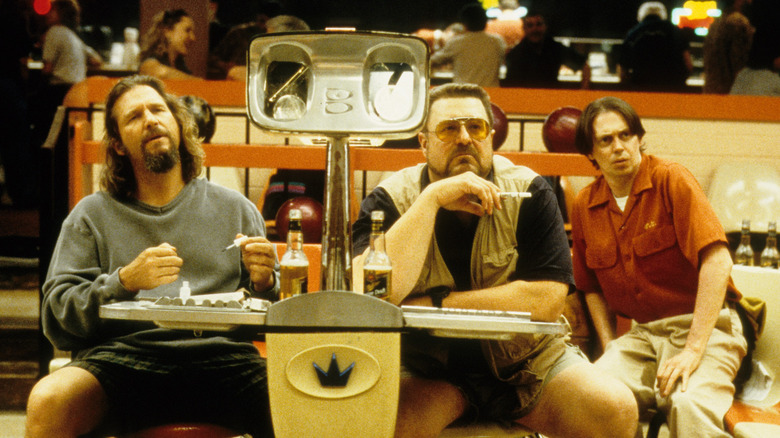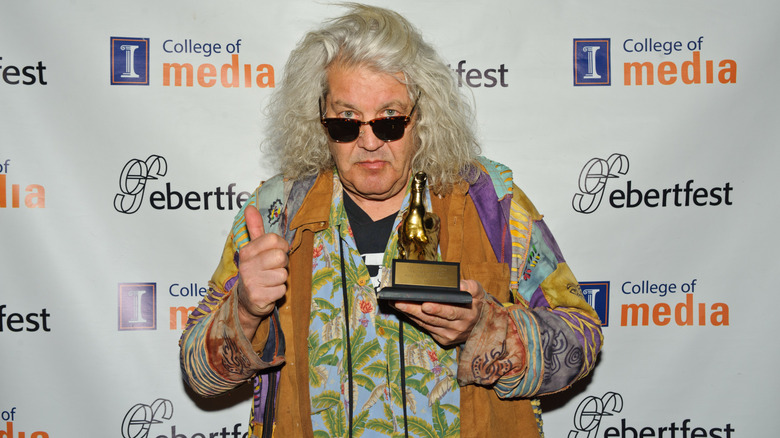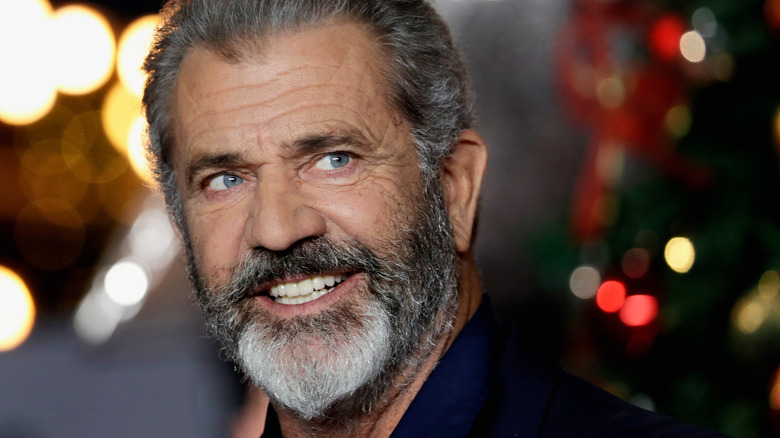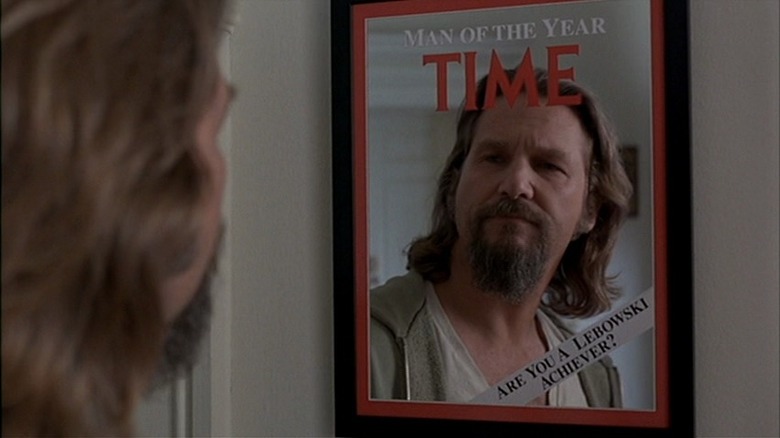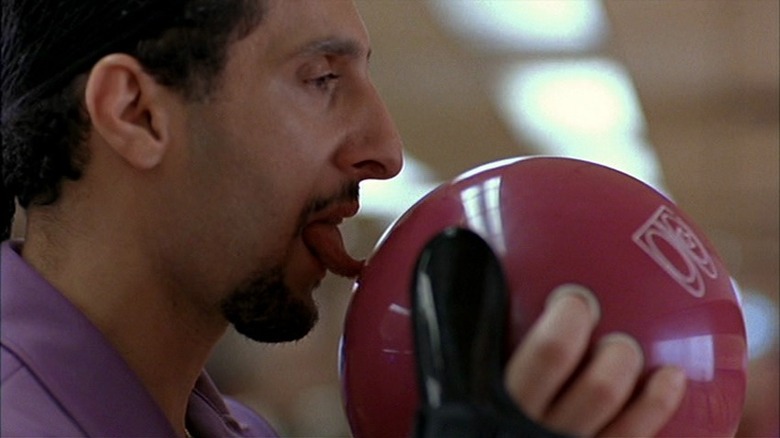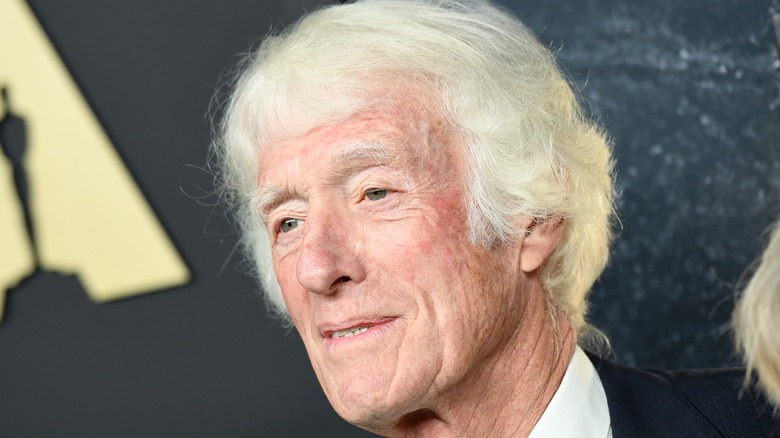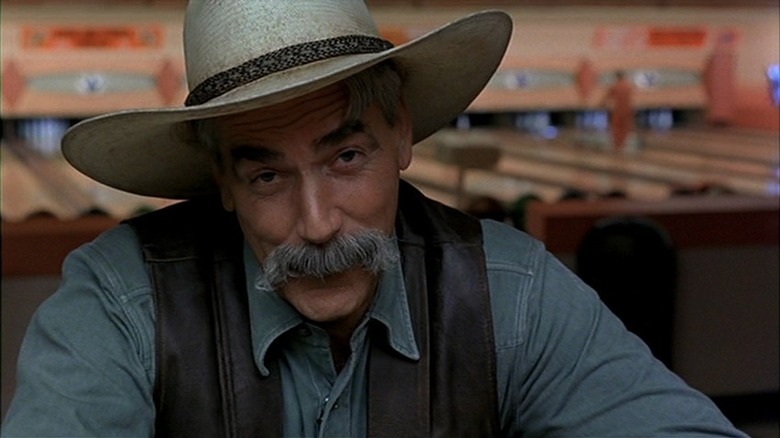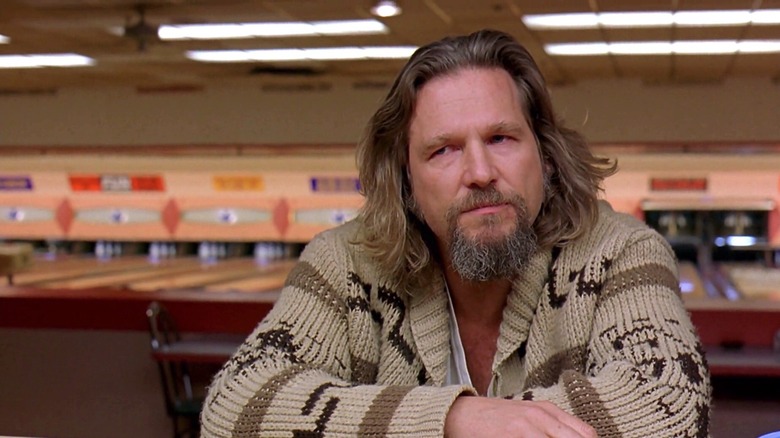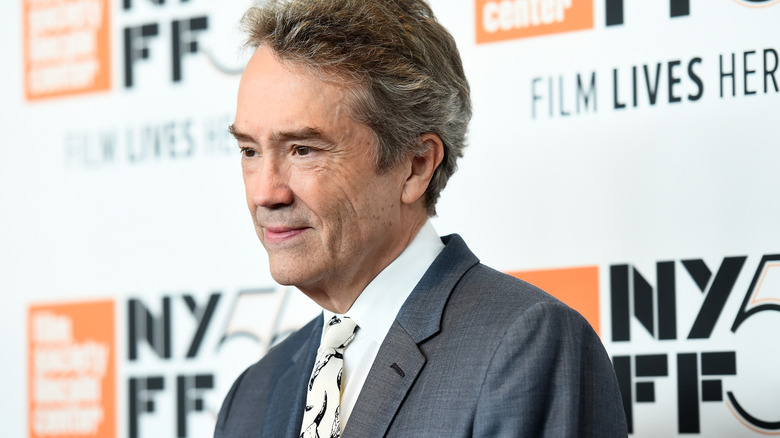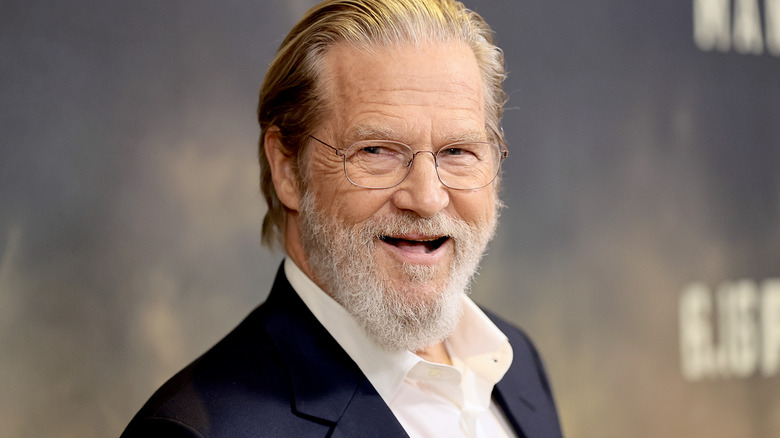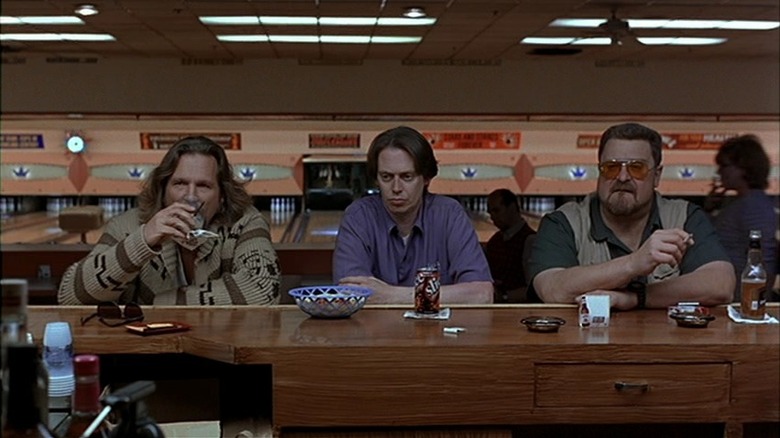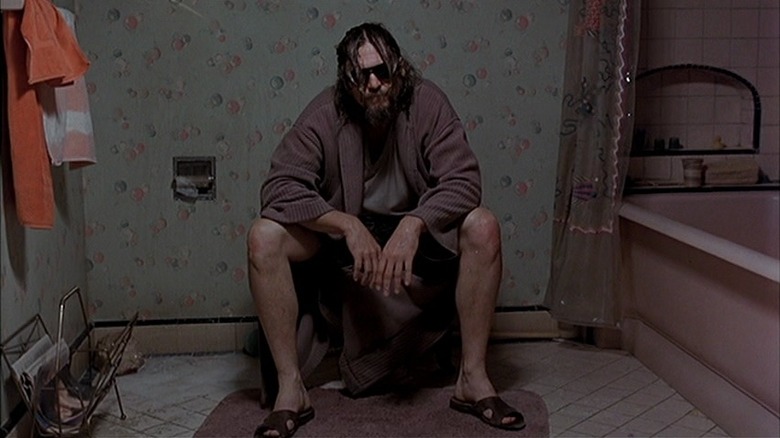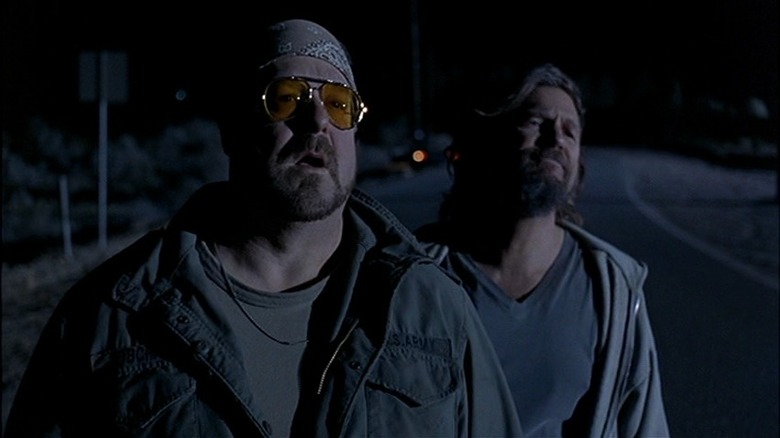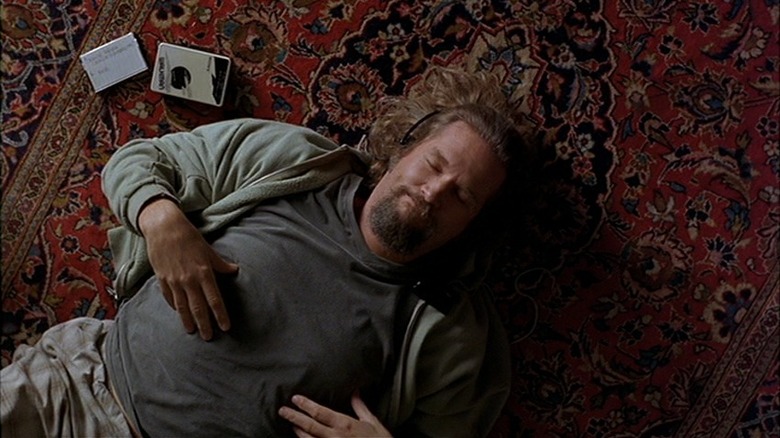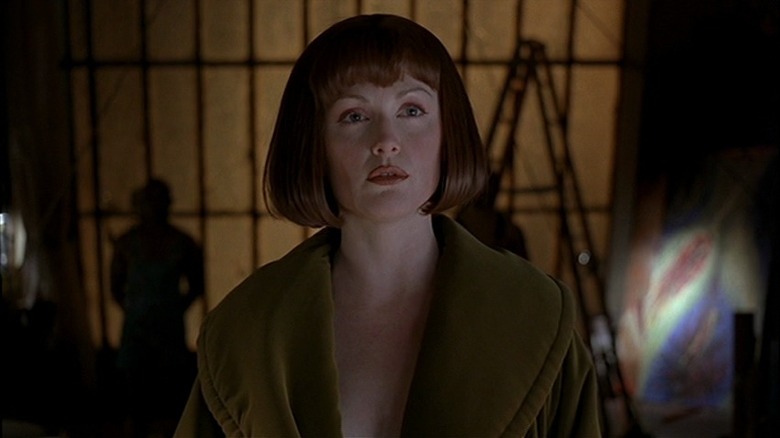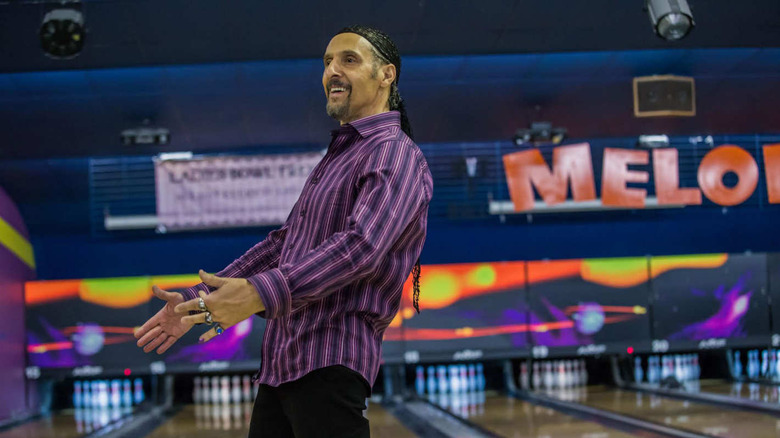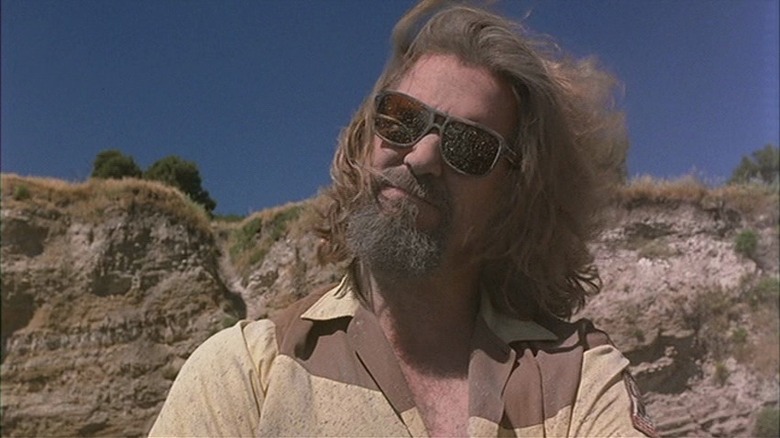Tie The Room Together With These The Big Lebowski Facts
Movies by Joel and Ethan Coen tend to be stories about human beings trapped in scenarios they can't possibly hope to comprehend. Sometimes, they explore this concept through darker and tragic means like in "A Serious Man," "Inside Llewyn Davis," or "No Country for Old Men." Other times, the pair filtered this theme through the lens of dark comedy like "The Big Lebowski." The duo's 1998 masterpiece is responsible for delivering an incredible amount of quotable lines, a killer soundtrack, and some of the best performances from a bevy of talented actors.
Today, "The Big Lebowski" is a stone-cold cult classic that dazzles in its assured filmmaking as much as it amuses with its wit. But this movie's creation and lasting pop culture legacy will equally fascinate fans. In honor of its upcoming 25th anniversary, we'll dive into the fun facts — covering everything from the incredibly unexpected actor who initially courted for the role of The Dude, its soundtrack creation, and even how certain cast members feel about the concept of doing a "The Big Lebowski" sequel. The Dude takes it easy, but we're here to dig into the details, as the film hits even better after knowing these truths.
Who insppired The Dude?
Part of what makes The Dude (Jeff Bridges) in "The Big Lebowski" so much fun to watch is his realistic sauntering into scenes. Despite seeming like a caricature on paper, everything from his mannerisms to his physicality conjures up images of people you know or traits you might have. That relatability makes it entertaining to watch The Dude get wrapped up in a scenario so much bigger than himself. That quality also makes it no surprise that someone in real life helped inspire Joel and Ethan Coen's creation.
Producer Jeff Dowd was the man whose unforgettable persona and passion for bowling laid the foundation for The Dude. Dowd explained to Yahoo Movies that, even before "The Big Lebowski" came out, famous actors would do impression of him because his personality was so distinctive. The Coen Brothers, who worked with Dowd on their directorial debut "Blood Simple," found his demeanor irresistible and used it to mold the character of The Dude. Dowd and this fictional character were so intertwined that the producer was even on the movie set to offer advice to Jeff Bridges on his performance. Considering the character's real-world inspiration, it's no surprise The Dude resonates as so rooted in reality for millions of people.
Mel Gibson was the first choice for The Dude
Now it's impossible to imagine anyone but Jeff Bridges portraying The Dude. Playing a nonchalant slacker comes so naturally to Bridges because he lends immediate believability to the part. In subsequent years, Bridges has inhabited roles that have provided tips of the hat to The Dude, particularly his voice-over work as Big Z in the 2007 comedy "Surf's Up." All of these elements have combined to make sure that Jeff Bridges feels indispensable from the cast of "The Big Lebowski." However, he wasn't the original pick for this role.
Joel and Ethan Coen struggled initially to figure out who could play The Dude. Their first casting idea was Mel Gibson – then one of the most sought-after actors on the planet. Securing his presence would've brought a lot of attention to "The Big Lebowski," though it's difficult to imagine an actor known for being intense as a good fit for the laidback role of The Dude. Gibson's suitability for the part eventually became a non-issue since the actor failed to connect to "The Big Lebowski" screenplay. After Mel Gibson became a no-go, they pursued Jeff Bridges. The Coen brothers became so enamored with the idea of Bridges playing this character that they delayed the film's production to work around the actor's busy schedule.
Raymond Chandler mysteries influenced its story
Raymond Chandler's mystery novels have proven to be widely influential, informing pop culture in wildly varied ways. Sometimes, the lingering presence of Chandler is glaringly apparent — like in modern-day adaptations. Other times, it's a bit more subtle, with modern movies evoking his writing style but not necessarily being a direct adaptation of his stories. An example of the latter phenomenon is "The Big Lebowski," which was built from the ground up with the spirit of Chandler's novels.
Joel Coen explained to IndieWire that the impetus for making "The Big Lebowski" was that he and Ethan Coen wanted to make a movie in the vein of classic Chandler novels, namely featuring a labyrinthine narrative that's far less important than it initially appears to be. Of course, the duo put their twists on the hallmarks of classic Chandler novels: Having the private eye protagonist be The Dude gave their film a unique flourish. Among its many creative accomplishments, "The Big Lebowski" is one of the most obvious ways that Chandler's work as an author endures.
The film almost centered on softball
Throw a stone in the cinematic landscape and you're bound to hit a movie that focuses on basketball, football, or baseball. These are the go-to cinematic sports in American film, with their popularity translating to an equally ubiquitous presence in cinema. Bowling in films, on the other hand, is a lot more obscure. But "The Big Lebowski" did its part to correct this erasure. Several of the most entertaining scenes of the film focus on The Dude, Walter, and Donnie hanging out and shooting the breeze while trying to knock down some pins.
Believe it or not, the original screenplay for "The Big Lebowski" deprived cinema of one of its few major bowling movies. Joel and Ethan Coen explained to IndieWire that The Dude was originally written to be on a softball league, which was a favorite sport of Jeff Dowd. In the spirit of finding a more dynamic sport on the screen that could open up more space for dialogue between characters, they decided that The Dude should become a bowler. Plus, the ubiquity of blowing in Los Angeles helped to make "The Big Lebowski" feel even more at home.
Cinematographer Roger Deakins barreled into shooting
The cinematography of Roger Deakins is famous for a reason. The films he's shot — ranging from blockbusters like "Skyfall" to dramas like "Doubt" and even the animated comedy "Rango" — all have such evocative imagery, relying on the tiniest details. But these well-aligned details are so organically folded into a given scene that you're unlikely to notice just how much effort's gone into capturing mundane environments like a convenience store in "No Country for Old Men." But if you take a closer look at his work, you'll understand how much craft has gone into the lighting, blocking, and framing of his films.
All that precision isn't done overnight! But sometimes Deakins doesn't get all the time in the world to prepare. Deakins recalled to The Film Experience how he didn't have much prep time on "The Big Lebowski" because of his lengthy commitment to doing the cinematography for Martin Scorsese's "Kundun." When he wrapped up "Kundun," he leaped right into the cinematography of "The Big Lebowski." While that meant Deakins couldn't prepare for his process as he would in other movies, it feels appropriate that he'd barrel into the Coen brothers' film. After all, The Dude is always thinking on his feet without preparation. Deakins and his lack of cinematography prep-time function as a great parallel to that character detail.
Sam Eillot's name was in the original script
Sam Elliot is such a distinctive actor that you can't just throw him into any role. That's no insult to his range as a performer, it's just that not every fictional character is going to benefit from his unforgettable persona. When Elliot saw that Joel and Ethan Coen had written that the opening narration would be delivered through a husky voice like Sam Elliot's in their screenplay, he was reminded of how idiosyncratic of an artist he is. (This filmmaking duo was name-dropping Elliot before he even knew the project existed!)
Elliot continued reading the script and noted that the character known as The Stranger was described as looking explicitly like Sam Elliot when he initially appears. Initially, Elliot was discouraged that "The Big Lebowski" script was tailor-making a character for him that was rooted in western cliches: He hoped the screenplay would offer him a chance to eschew that cowboy image. But Elliot ended up enjoying the role so much that it made him appreciate how synonymous he's become with the world of westerns. Not every actor can be so distinctive that they can get referenced in the pages of a screenplay!
What line helped the film secure a Rolling Stones tune
One might imagine that opting to use a cover version of the Rolling Stones' ditty "Dead Flowers" rather than an original version might've made it easier (or at least cheaper) to score the film's music rights. However, to even secure those rights to a cover version of "Dead Flowers," the creative team needed to go through the former manager of the Rolling Stones, Allen Klein. This figure was open to letting the tune show up in "Lebowski" but he wanted to watch a screening of the feature first before officially committing.
As the story goes, Klein watched an early cut of "The Big Lebowski" and cheered when The Dude slammed The Eagles. This piece of dialogue resonated with Klein and changed the production of "The Big Lebowski" completely. Not only could the movie secure the rights to that cover version of "Dead Flowers," but Klein handwaved away the fee to secure the tune. It's an incredible and preposterous turn of events that could only happen within a Coen Brothers movie. The power of good screenwriting, and a well-timed slam on The Eagles, can do truly unthinkable things.
Carter Burwell's approach to the Lebowski score
Ironically, when concocting his original score for "The Big Lebowski," composer Carter Burwell leaned heavily into pre-existing music. Burwell explained to Little White Lies that Joel and Ethan Coen were insistent from the get-go that all the tunes that The Dude listens to were as integral to his character as anything else. Conscious of how many tracks from famous artists like Bob Dylan would be in the film, Burwell got to work on a score that could fit seamlessly alongside all the needle drops.
A key element of this approach was making sure the score would often originate from in-universe sources. Characters turning on the radio would suddenly be blasting original compositions from Burwell while an in-universe band could play tunes that were part of the score. Going this route meant that Burwell's score was on equal footing with The Dude's tunes. This method created consistency across the musical landscape of "The Big Lebowski," an irony given how intentionally disjointed and messy The Dude's search for answers turns out to be.
How Jeff Bridges first learned on The Big Lebowski
The saga of Jeff Bridges and The Dude all starts with a party. Bridges recounted to the SmartLess podcast that he was at a seemingly ordinary shindig when he happened to run into Joel and Ethan Coen. During their discussions, Bridges was told that they were writing a script that featured a character that would be perfect for Bridges. Enamored with the Coen brothers' first movie, "Blood Simple," Bridges was incredibly excited by the prospect of working with them.
When Bridges got the screenplay and read the part of The Dude, his initial response was astonishment. It's not that the script repulsed Bridges or anything like that. On the contrary, the actor was amazed at how much The Dude felt like a perfect snapshot of himself back in high school. Despite being so creepily close to the real-world version of younger Bridges, this performer was attracted to the role because he'd never gotten a chance to play somebody like The Dude in his career. From there, Jeff Bridges became one of the most critical parts of the film's success, turning it into a pop culture phenomenon. To think, it all started at just one party!
Steve Buscemi wasn't initially sure about playing Donnie
Many people fell in love with"The Big Lebowski" during their first watch. Just a few minutes into this movie, it's hard not to admire this quirky movie and its unique humor. Of course, something as idiosyncratic in its comedy and filmmaking as "The Big Lebowski" is bound to inspire some division: No movie can be for everybody. Surprisingly, one soul was initially hesitant about joining the cast. Steve Buscemi, who was essential to this movie's construction, was puzzled before becoming captivated by "The Big Lebowski" script.
Buscemi explained to The Today Show that his initial response to reading the character of Donnie was confusion. Buscemi's heart ached for a guy who was always getting picked on by other people. While reading the script, he was trying to figure out how to tell the filmmakers that he didn't want to play this role. But concerns about the script being too mean-spirited vanished once Buscemi got to the final Donnie scene and he saw the affection between these characters. Eventually, Buscemi joined countless others who were won over by "The Big Lebowski."
Jeff Bridges is proud The Big Lebowski wasn't built on improv
"The Big Lebowski" is built on imperfect conversations and ill-advised spur-of-the-moment assumptions: That's why its dialogue feels so achingly real and uncomfortably authentic. The Dude and his cohorts don't feel like polished visions of stoned slackers. They come across as real people. The exchanges within "The Big Lebowski" seem so realistically ramshackle that one could be forgiven for thinking that so many of the film's famous lines were improvised. However, Jeff Bridges has always worn the fact that the movie eschewed improvised lines like a badge of honor.
Bridges explained to The Today Show that the conversational nature of the dialogue was apparent right from the first draft of "The Big Lebowski." There was no need to conjure up further lines on set to create a sense of realism. While performing the character, Bridges was insistent and conscious of making sure his delivery of the lines didn't differ from what Joel and Ethan Coen had written. This dedication to fidelity resulted in incredibly sharply-written lines of dialogue being perfectly realized on-screen. Given the craft that went into this writing and performances, it's not hard to see how people just assumed The Dude's ramblings had to be the result of improv.
Which Big Lebowski scene John Goodman was nervous to shoot
Decades after he first shot his work as Walter in "The Big Lebowski," John Goodman reminisced to GQ about the splendid experience he had filming that movie. Though he was playing such an intense and aggressive person, Goodman had a great rapport with his co-stars and enjoyed working with Joel and Ethan Coen again. However, there was one issue for Goodman during the shoot: a sequence where Walter had to go destroy a car and shout to the heavens in a normal suburban neighborhood. Goodman didn't want to disturb anyone with such a loud performance.
Just before cameras began rolling, Goodman was informed that there was nobody in the nearby area. The production had paid local residents to stay somewhere else for one evening. Now that there was no reason for Goodman to be nervous about being disruptive, he could focus on depicting all the rage and violence Walter needed to exhibit. Reflecting on it, Goodman wistfully noted that it was incredibly fun to smash up a Corvette with a crowbar.
The Big Lebowski wasn't originally a hit
While "The Big Lebowski" is incredibly well-known and has become the kind of movie where just dropping one quote from it at a party will inspire everybody to share their favorite moments, it wasn't always a hit. But like many unorthodox features that have garnered mass followings, "The Big Lebowski" didn't perform well at the box office. Technically, the film didn't crater financially, but its $17.4 million domestic total wasn't great for a movie that cost $15 million to make. (A stronger $28.6 million international haul helped to minimize the money lost.)
For comparison sake, "The Big Lebowski" made noticeably less in North America than previous Coen Brothers directorial efforts like "Fargo" or "Raising Arizona." That sizeable decrease was surprising given "Fargo" – an Oscar-nominated film that should have, in theory, helped lend an extra must-see factor to "The Big Lebowski." But the innate strangeness of the film and its unwillingness to engage in traditional narrative exploits seems to have turned off moviegoers in 1998. "Fargo" debuted in limited theaters and gradually built a word-of-mouth following over time. But "The Big Lebowski" opened in wide release right away, limiting its chances for an extensive theatrical run. Of course, given how "The Big Lebowski" has endured in pop culture for decades and shows no signs of slowing down, all these box office shortcomings are in the rearview mirror.
The cult following of The Big Lebowski
While it didn't initially take off in theaters, "The Big Lebowski" and its idiosyncratic atmosphere eventually amassed a massive cult following. These characters were so distinctive and unabashedly unlike "normal" movie characters. They were bound to resonate profoundly with some sections of the general population. In the years following its release, quotes from the movie dominated T-shirts and tattoo parlors across the globe. It's not unusual for initially divisive films to become cult classics — just look at "The Rocky Horror Picture Show" or "Scott Pilgrim vs. the World." But there is one aspect of "The Big Lebowski" that sets it apart from most cinematic cult classics.
Unlike other movies that spawn an enduring fanbase, "The Big Lebowski" started a religion. Entitled Dudeism, this religion attempts to streamline life by having its followers and teachers adhere to the lifestyle practiced by The Dude. Everything's mellow and there's no judgment cast on those who deviate from society's norms. This religion and its name have become so rampant in the broader world that Jeff Bridges referenced it on Twitter in March 2021. The phenomenon of Dudeism is one of the most pronounced and sprawling ways the film's fanbase has become.
That time The Big Lebowski got a spin-off
"The Big Lebowski" is not the kind of movie you associate with scoring spin-offs or a franchise. But it technically did thanks to 2022's "The Jesus Rolls." The film followed John Turturro reprising his role as Jesus in a standalone adventure. Written and directed by Turturro, the project didn't have the involvement of either Joel or Ethan Coen. It did, however, feature a stacked supporting cast that included Susan Sarandon, Pete Davidson, and Christopher Walken — though none of the other actors from "Lebowski" showed up to lend further credibility to this offshoot.
Turturro had a passion for this character, but that didn't translate into a movie worthy of "The Big Lebowski" legacy. "The Jesus Rolls" was torn to shreds by critics, who bemoaned the lackluster quality of the script and how Jesus was not interesting enough to function as a protagonist. Since its 2020 release, "The Jesus Rolls" has faded into obscurity, destined to only be remembered at "The Big Lebowski"-themed trivia nights. However, its existence, and Turturro's relentless determination to make it, speak to the enormous pop culture legacy of the original film.
Some of the actors want a Big Lebowski sequel
Despite "The Big Lebowski" rocketing success and pop culture notoriety, there have never been official talks about a sequel. The unofficial spin-off movie "The Jesus Rolls" exists, of course, while the universe of "The Big Lebowski" got referenced roughly 20 years after the initial film in a season three episode of "Fargo." However, none of these projects have been direct follow-ups to The Dude and his exploits — let alone feature Jeff Bridges reprising the character in a feature-length context. Still, that doesn't mean the film's cast isn't excited over the idea of a sequel.
In 2015, Bridges and Julianne Moore were promoting "Seventh Son," a fantasy blockbuster that allowed the actors to reunite. Bridges and Moore noted to MTV that they would be down for another "The Big Lebowski" movie, with Bridges seeming intrigued by the notion. However, the two actors were firm in saying they would only appear in it if the sequel was made by Joel and Ethan Coen. Currently, there are no plans for a sequel. But these comments from 2015 make it clear that if the Coen brothers get a concept for a follow-up, Bridges and Moore will be there!
